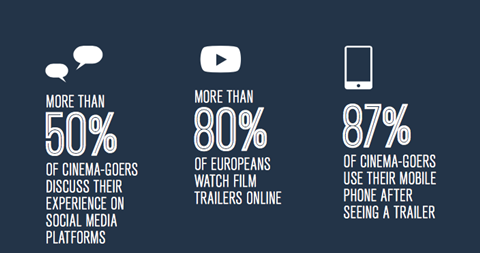Operators who embrace innovation have the opportunity to drive deeper engagement with cinema-goers.
Laura Houlgatte, CEO of the International Union of Cinemas (UNIC), represents filmic trade bodies and key operators in 36 European territories.
“We promote the cultural, social and economic benefits of a vibrant cinema-going culture and provide a strong, influential voice for European cinema operators,” says Houlgatte.
“Audience growth and box office results over recent years show that cinema-going in Europe is thriving and becoming an ever more engaging, diverse and immersive experience. We recorded 1.28 billion visits in 2016, an increase of 2.8% over 2015,” she adds.
“In an increasingly fragmented entertainment landscape, cinema operators recognise that it is crucial to understand what the movie-going audience expects.”
Houlgatte refers to the results of an 18-month research project exploring the drivers, barriers and preferences of young cinema audiences in Spain and the UK.
“Teenagers have access to a myriad of digital distractions and out-of-home leisure opportunities, so ensuring that this generation continues to enjoy movies on the big screen is vital for the future of our business,” she says. “This is supported by another recent survey carried out by UNIC amongst its members, which shows that 89% of respondents agree that the 12 to 25-age group is a key target.”
Cinema is regarded as a special event, and as an opportunity to dive into another world. But UNIC keeps in mind that digital is a lifestyle for young audiences. What are cinemas able to do?
“To fulfil the needs of teenagers, in terms of convenience one example is through hassle-free cinema apps. In terms of engagement it is through social media promotion of movies. And in terms of making the experience memorable it is thanks to cutting-edge technology, and of course the content,” says Houlgatte.
To what degree have live theatre and other live events become an audiences/income boost to UNIC members?
“So far, what we call ‘alternative content’ or ‘event cinema’ revenues are on the up. Across our territories, this income represents 1-3% of the box office and in France, Germany and Italy, revenue linked to alternative content has been continuingly increasing,” says Houlgatte.
“Our study showed that young audiences are interested in seeing more than movies at the cinema; for example, they says they would like to see TV series, live screenings of eSports, live broadcasts of local sports events, and screens with additional content,” she adds.
“Massive improvements in sound and projection quality continue to transform the cinema-going experience”
Is the movie house business model a settled and happy one, or are there new technologies on the horizon?
“We are currently in the midst of a second wave of digital innovations, many of which would not have been possible without the seismic transition to digital cinema. In terms of revenue growth, 3D and new investment in cinema infrastructure in recent years have yielded noticeable returns. We can also further grow attendance through digital engagement and data analytics,” says Houlgatte.
“Nowadays, the cinema-going experience starts days before a visit to the theatre and operators are experimenting with new techniques to engage with potential guests before, during and after a screening.
“On the content side, event cinema and more targeted and diverse programming for increasingly fragmented audience groups would not have been possible 10 years ago,” she adds.
Operators must be equipped with an understanding of the technology that is on offer, while ensuring that the needs of the audience are the primary focus.
“Massive improvements in sound and projection quality, more flexible and efficient operations, as well as sophisticated engagement strategies continue to transform the cinema-going experience and to attract increasing audience levels. This is helping operators to beat other leisure activities,” says Houlgatte.

“In February, UNIC published a report on Innovation and the Big Screen, illustrating how European operators have embraced change and innovation. The report focuses on the main strands of innovation: creative audience development; the big screen experience; and social innovation,” she adds. “The innovation trend looks set to continue, with a seemingly never-ending flow of potentially disruptive technology making its way to our theatres, from VR to direct-view LED screens.”
Profile

Laura Houlgatte
CEO, UNIC
Region: Europe
Laura was appointed CEO of the International Union of Cinemas (‘UNIC’) in August 2017. UNIC represents cinema exhibitors and their national associations across 36 European territories. After graduating from Sciences Po (the Institute of Political Sciences, Strasbourg) she lived in Ireland before moving to Brussels in 2011. She then worked for the British Council and the Federation of European Publishers, before joining UNIC in March 2015 as EU Affairs Executive. Laura has been working in the EU cultural policy field since she came to Brussels and has developed a substantial knowledge of the audiovisual and wider cultural field, as well as the policies that affect the cinema business. Together with her team, she is responsible for promoting the cultural, social and economic strengths of European cinema exhibition and having a positive influence on the decision-making and policies that impact on cinemas.


















No comments yet